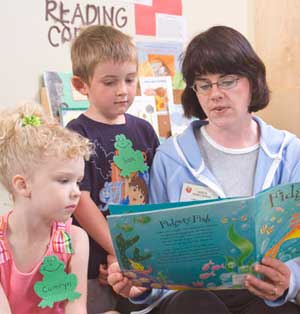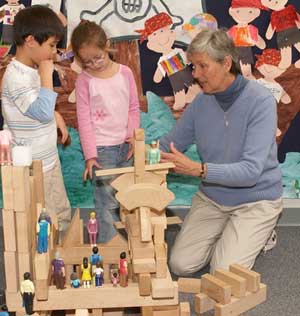Early Childhood Teacher
Tasks & duties

Early childhood teachers may do some or all of the following:
-
plan the centre's daily programmes, learning experiences and routines
-
implement Te Whāriki, the early childhood curriculum
-
observe children individually and in groups to assess their abilities, strengths and interests
-
educate and care for children
-
assess and record the individual learning and development of each child
-
discuss children's progress with their parents or caregivers, whānau and other education professionals
-
make or adapt learning resources
-
model appropriate mealtime behaviour and supervise sleep times
-
provide educational opportunities for parents, caregivers and whānau through activities such as workshops
-
support children to make the transition to school
-
attend social gatherings with children and their parents and caregivers
-
prepare budgets, order supplies and help manage the centre
-
make or adapt learning resources
Skills & knowledge

Early childhood teachers need to have:
-
knowledge of Te Whāriki, the early childhood curriculum
-
teaching skills, and knowledge of different teaching strategies and learning styles
-
the ability to plan programmes to encourage children's learning and development
-
knowledge of early literacy and numeracy
-
knowledge of child learning and development, including the ability to identify children with special needs or learning difficulties
-
skill in observing behaviour and evaluating children's progress
-
communication skills and the ability to relate well to children and adults from a range of cultures
-
listening skills
-
research skills and knowledge of how to access information and resources
-
administration and report writing skills
-
organisational skills
-
problem-solving and decision-making skills
-
first aid skills
-
the ability to supervise children in large areas
- computer skills
Entry requirements
To become a qualified, registered early childhood teacher you need to have an early childhood teacher degree such as a Bachelor of Teaching (Early Childhood Education), a Graduate Diploma of Teaching (Early Childhood Education), or a Diploma of Teaching (Early Childhood Education).
There are a number of scholarships avaliable to people studying to be early childhood teachers.
Secondary education
To enter an early childhood teacher education programme university entrance (NCEA Level 3) is required. Some diploma programmes have slightly lower entry requirements.
Training on the job
Early childhood teachers need to do ongoing training and professional development throughout their teaching careers. Some teacher education providers offer centre-based programmes of study to enable early childhood teachers to train on the job. This includes Montessori teachers who train while they work.
Registration
New government policies require that early childhood teachers are qualified and registered.
First-year early childhood teachers can become provisionally registered with the New Zealand Teachers Council and are issued with a practising certificate. They can gain full registration after two years of satisfactory work as a teacher.
Useful experience
Useful experience for early childhood teachers prior to training includes:
-
childcare work or experience with children
-
babysitting or work as a nanny
-
counselling
-
experience working with people from different cultures
Related courses
Bilingual Early Childhood Teacher Training (Pre-Service)
General Primary and Secondary Education
Teacher Education: Early Childhood (Pre-Service)
Teacher Education: General (Pre-Service)
Teacher Professional Development
For more information, please refer to Career Services.
Document Actions
